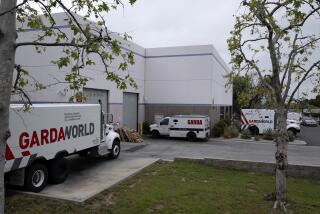How to Avoid Fraud? ‘If They Call You, Hang Up’
After three precious metals companies in Orange County were raided by fraud investigators earlier this week, state and federal officials said Friday that an investigation could take months, if not years.
And one state regulator, Steve Adler, the assistant attorney general in charge of the state’s major fraud unit in San Diego, advises prospective buyers that “if you want to buy something over the phone, you call them. If they call you, hang up.”
During a raid Thursday, local, state and federal law enforcement agents seized books and records from World Equity Mint in Anaheim, Associated Miners Group in Santa Ana and Mint Management in Tustin. Fraud investigators acted after they received complaints from buyers across the country. They suspect that the companies swindled investors out of millions of dollars through a deal whereby people were persuaded over the telephone to buy bogus orders of gold, silver or platinum.
The man whom officials believe manages the three companies, James Boone of Buena Park, was vacationing in Las Vegas. No one was arrested on fraud-related charges, although two employees were arrested on outstanding traffic warrants. Boone’s lawyer has denied that there was any wrongdoing.
In “boiler room” operations--so called because sellers traditionally operated out of basements--the companies hardly ever buy what is being sold. They close down before cheated investors or fraud investigators can catch up with them, only to resurface later under a new name.
Orange County has been called the precious metals fraud capital of the country by law enforcement officials, who warn prospective buyers to be wary of “telephonic sellers” who promise big investment returns on low-priced coins.
Perhaps the only bright side for Southland residents is that the firms target out-of-state buyers almost exclusively, said Bill McDonald of the California Department of Corporations in Los Angeles. “Some of them set up their phones so they can’t call in the state,” he said.
But because the companies’ buyers are scattered throughout the country, he said, investigators are faced with an arduous and expensive task when it comes to compiling information and interviewing witnesses when a company is prosecuted, McDonald said.
“It’s very, very, very expensive,” Adler said of these investigations. “You have to go through 20 to 30 victims before you nail down what the actual deal was in the (telephone) conversation.”
The distance between company and investor also makes it difficult for the prospective buyer to check the firm’s legitimacy, McDonald said.
Adler and other fraud investigators on the state and federal levels advise investors to do their precious metals shopping through banks, established brokerage firms such as E.F. Hutton or Merrill Lynch, or through companies registered with the Commodity Futures Trading Commission. The commission is the federal agency charged with regulating the trading of precious metals and other commodities.
Ponzi Schemes
“There isn’t an easy way to tell which of the telephonic sellers is legitimate,” warned Mike Raymer, an analyst with the state’s public inquiry unit in Sacramento. “The reality is that most of these outfits turn out to be Ponzi schemes that pay off old investors with new investors’ money.”
Unlike companies regulated by the CFTC that buy and sell futures contracts--options to buy a quantity of a certain commodity at a later date--boiler room concerns escape trading commission jurisdiction because they claim to buy not merely an option but the actual commodity, such as precious metals, for the investor, Raymer explained.
The boiler room company, once given the investor’s money and a fee for handling the transaction, never buys the coins, Raymer said. Rather, it sends the investor a certificate or notice saying the commodity is being held in a bank until the date when the investor and the company had previously agreed that the commodity would be delivered to the buyer.
The investor, for his or her part, expects nothing more because his profit strategy is usually not to physically hold the commodity, just to resell it--at a higher market price, it is hoped--at the time of the delivery date.
“It’s amazing to me that these telephonic sellers can get people to cough up their life’s savings over the phone with a company they’ve never seen,” Raymer said.
Registration No Guarantee
Boiler room salespeople may try to make a company sound legitimate by boasting of its registration with the state attorney general’s office, Raymer added, but all companies selling commodities over the phone are required to register with the attorney general, which costs $50.
Furthermore, he said, salespeople are forbidden by law to mention the registration during a sales pitch. “If they tell you they’re registered with the attorney general’s office,” he said, “that’s a violation right there. My answer to that is, ‘Look out.’ ”
Terree Bowers, chief of major fraud for the U.S. attorney general’s boiler room task force, said most of these companies moved to Southern California from Florida after that state’s law enforcement agencies “turned up the pressure in the boiler rooms” there through tougher legislation.
Operators of these companies may have been attracted to California because “it’s a nice place to work,” Adler said, adding that the businesses may be luring customers with “place names like Beverly Hills and Newport Beach.”
More to Read
Sign up for Essential California
The most important California stories and recommendations in your inbox every morning.
You may occasionally receive promotional content from the Los Angeles Times.










